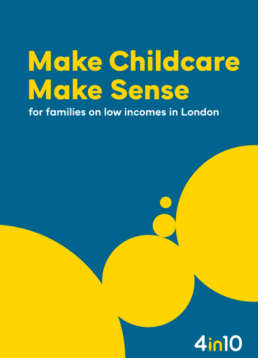Childcare reform and tackling child poverty must go hand in hand

Early education and childcare has not been at the forefront of the last few elections but notably this time around it is a hot topic. All the main political parties seem to recognise, albeit from differing perspectives perhaps, that there is much to be gained from better supporting and investing in children in their earliest years. The Conservatives have re-emphasised their commitment to rolling out 30 hours of childcare a week to working parents with children from nine months old to when they start school by September 2025. The Labour Party have also pledged to deliver this same commitment and plan to open an additional 3,000 nurseries through upgrading space in primary schools to help them do so. The Liberal Democrats for their part say they would close the attainment gap by giving disadvantaged children aged 3 and 4 an extra five hours free a week and tripling the Early Years Pupil Premium to £1,000 a year.
The question we, as London’s Child Poverty Network are asking of all these offerings is whether they will benefit children and families experiencing poverty who at the moment are benefiting less from the system than their wealthier peers. Back in March we published a research report ‘Make Childcare Make Sense for families on low incomes in London’. In it we looked through the eyes of parents of young children living on low incomes in London and found that the current childcare system makes little sense to them. The funding entitlements were often not accessible as they couldn’t be used without having to pay ‘top ups’; they were not flexible enough to meet their individual circumstances; and were not inclusive for their children, those with special educational needs and disabilities and those whose families have no recourse to public funds being especially likely to be excluded. One single mum of a three-year-old told us:
‘You know, you’re kind of making lots and lots of sacrifices to afford what essentially is a basic need to help our economy keep moving. Yeah, [the childcare system] just shuts people out of work.’
Sadly, the Government’s expansion of funding entitlements which began to be rolled out shortly after our report was published in April this year, will do little to improve the situation for these families. Just 1 in 5 (or 20%) of families earning less than £20,000 a year will have access to the planned expansion of funded places for one- and two-year-olds in some working families, compared to 80% of those with household incomes over £45,000.[1] This matters to us because access to affordable, high-quality childcare and tackling child poverty are inextricably linked.
Sky high childcare costs in London are one driver of our high child poverty rate; including childcare costs in the Social Metric Commission’s measure of poverty increases the poverty rate among families with children by 0.4 percentage points.[2] So, at the most straightforward level, bringing down childcare costs, for those that already incur them, has the potential to reduce levels of child poverty. Beyond this, affordable and accessible childcare can contribute to poverty alleviation by supporting parents and carers to access paid work if they do not already or to increase their hours, and so increase their household income. Lastly but certainly not least, we know that high quality early education is critical to a child’s development and later educational achievement.[3]
For all these reasons, it is imperative that whoever forms the next Government deliver an early education and childcare system that benefits all children. We believe that the best way to make sure this happens is for childcare reform to be at the heart of a strategy to address child poverty. The Labour Party has made a very welcome commitment in its manifesto to putting in place a Child Poverty Strategy, it must make sure that its policy on childcare in a key plank of this. If it doesn’t and this synergy isn’t realised is a very real risk that childcare policy rather than reducing inequality, could increase it.
[1] Drayton, E. et al. (2023). Childcare reforms create a new branch of the welfare state – but also huge risks to the market. Institute for Fiscal Studies. Available at: https://ifs.org.uk/ news/childcare-reforms-createnew-branch-welfare-state-alsohuge-risks-market
[2] Poverty Strategy Commission (September 2023) Interim Report: A new strategy for tackling poverty
[3] Melhuish, E. and Gardiner, J. (2023). Equal hours? Sutton Trust
A young person speaks: the Local Child Poverty Statistics 2024

By Layla, aged 19 from London (name changed to protect her identity)
I respond to this news not just as a young person, but as someone who has personally experienced the harsh realities of poverty. The recent findings from Loughborough University for the End Child Poverty Coalition resonate deeply with me, and seeing that over 30% of children across the UK are living in poverty, with two-thirds of new constituencies having at least a quarter of children facing this struggle, brings back vivid memories of my own childhood and the beginning of my own adulthood.
Growing up in poverty meant constant uncertainty and anxiety, and meant watching my care giver struggle to make ends meet, sometimes having to choose between paying bills or buying food. It meant missing out on school trips, new clothes, and being pointed out as the free school meals kid. What I’m trying to say is that these are not just statistics; they represent real lives, real struggles, and real futures at risk.
Hearing the call from the End Child Poverty Coalition for political parties to prioritise this issue fills me with a sense of urgency as it would not just be a policy change, but a lifeline for many families.
The disparities highlighted, especially in areas like the North East, London, and the North West, show that this issue is widespread and deeply rooted. It isn’t enough to just acknowledge the problem; we must act.
As someone who has walked this path, I urge our leaders to listen and to act. the upcoming election is a chance to commit to real, meaningful change, and ensuring that no child has to grow up feeling the weight of poverty, and having the opportunity to thrive is something every party should aim to include in their campaign.
Can a national child poverty strategy be all things to all children?

Well, just as we were drawing breath after the London elections, we find ourselves back in election mode once more. And once again we will be straining every sinew to ensure that child poverty is a central issue of the campaign and one that all the political parties are held to account on. In particular we will be making the case for all parties to pledge to a child poverty strategy that not only makes firm and time-bound commitments about reducing and ultimately eradicating child poverty but also recognises that achieving this aim will require different approaches in different parts of the country.
Of course, some of the key policies that we, along with over 100 other members of the End Child Poverty Coalition, want to see front and centre in a child poverty strategy such as abolition of the two-child limit and benefit cap, are ones that an incoming Government in Westminster alone can implement. But we also need a child poverty strategy that operates regionally and locally so that it can respond to the different contexts that children live in across the country. For example, in the North East child poverty is driven in large part by low pay, insecure work and out-of-work poverty (North East Child Poverty Commission, 2024), whereas in London it is exorbitantly high housing costs along with costs such as childcare that are the major issue. Important new analysis from our colleagues at Trust for London and WPI Economics exploring the possible reasons behind the apparent fall in overall poverty numbers in London in the past few years, suggests that costs are now so high that for many people the only way to escape poverty in our city is to leave it.
A national child poverty strategy that fails to recognise these regional differences and allow for differential responses is not going to have the impact it so urgently needs to. The incoming Government, must engage with and harness the data and knowledge that the Greater London Authority, combined and local authorities have about their regions and localities and establish mechanisms to ensure sustained focus and action on the issue at regional and local level. Moreover, it needs to recognise the impact that the collapse of local government funding has had on children’s services which has undoubtedly affected the poorest children most. It is crucial that a child poverty strategy ensures that local authorities are sufficiently resourced to meet the needs of the children living in their communities.
So, in answer to the question, yes, a national child poverty can and must deliver for all the UK’s children, no child wherever they live should be experiencing poverty, but this will only be achieved if we acknowledge and respond to their different circumstances. From our perspective as the London Child Poverty Network, we will use the coming weeks to champion as loudly as we can the right of the 700,000 children living in poverty in London to live in a poverty free city, a goal that we firmly believe is achievable if the political will is there to achieve it.
Tackling child poverty must be high on the new mayor's agenda

Yesterday Londoners went to the polls to elect their Mayor and members of the London Assembly. As we await the results, it is a good moment to pause and consider what should be at the top of the Mayor’s agenda from day one of their new term of office. From our perspective at London’s Child Poverty Network we are crystal clear that tackling the high levels of child poverty that continue to mar our city must be up there.
The first crucial step towards bringing about a child poverty free London must be to work with those children, families and those organisations who support them in their communities to develop a strategic response to tackling the problem over the next four years. As a network we have been very supportive of Sadiq Khan’s move to guarantee free school meals for all primary school children in the city, which demonstrates that he gets the severity of the situation and the need to take bold action to address it – but we know that on its own, it is not enough. Now is the time to bring everyone to the table to decide what other actions need to be prioritised to address the systemic causes of poverty. And we are not the only ones saying so, just before the election period began back in March a cross-party group of London Assembly Members supported our call and published a report recommending that ‘[t]he Mayor, working in conjunction with local authorities and the voluntary sector, should publish a child poverty strategy for London in 2024-25.’
So, what are the key policies the strategy ought to contain? Well, it is a fact that many of the levers for reducing child poverty lie beyond the direct powers of the Mayor of London; our broken social security system for example, which exacerbates rather than ameliorates child poverty rates by setting benefit payments at levels which are not sufficient to provide families with essentials; discriminates against larger families through the two-child limit; and imposes sanctions that push families into debt rather providing them with the scaffolding they need to escape poverty. These are not policies the Mayor can directly change, although they can add their strong voice to the chorus of cries for reform.
Where the Mayor can take direct action though, they must. Child poverty in London is driven in large measure by the exorbitantly high costs of living in the city, housing first among them. Without access to decent housing, 84,940 children in our city are living in temporary accommodation, often deprived of basics such as access to a hot nutritious meal, a warm comfortable bed and space to play and learn. Whoever emerges victorious from the election count will already be well aware that sorting the housing crisis is going to be one of the biggest challenges they face and indeed all the main candidates have pledged to do so, in various ways, during their election campaigns. What we are calling for now is for these efforts to also be a central plank of a new child poverty strategy for the city. By looking afresh as the problem through this lens we can ensure that the housing that is built truly meets the needs of young families living on low incomes and enables them to live in and contribute to our city, as part of our communities rather displaced to other more affordable parts of the country.
Addressing high childcare costs must be part of a London child poverty strategy too. In our recent report Make Childcare Make Sense we looked at how sky-high childcare fees disproportionately affect families living on low incomes making it next to impossible for them to stay and/or progress in work and how an inclusive, affordable childcare system could vastly improve their and the children’s lives and allow them to contribute to London’s economic well-being. Getting the national childcare and early education policy framework right is essential to achieving this goal but so too is leadership and intervention at the London-wide level and our report sets out a series of recommendations for the Mayor and GLA.
Faced with these high housing and childcare costs, another reason many families in London struggle to make ends meet is a lack of high-quality, well-paid work; in London, almost half of those in poverty are in employment and in 2022, 17% of Londoners in work were paid below the London Living Wage (Trust for London). Many of these also face the issue of insecure work. Recent research from the Living Wage Foundation has found that there are over 800,000 insecure jobs in London. Addressing these twin issues of low pay and insecure work must be another strand of a child poverty strategy.
Finally, is also crucial that a strategy recognises the interaction between poverty and discrimination and has addressing it at its core. We cannot for example, ignore the fact that systemic racism and disablism in the education system often combined with the impact of poverty, is responsible for holding back some of our young people and preventing them from flourishing in the way they should. A child poverty strategy rooted in a human rights-based approach is key to achieving deep and lasting change.
So, once they have had a chance to catch their breath, we hope our newly elected Mayor will engage with us as a network, draw on our members’ rich and diverse experience and work with us to map out and deliver a plan for achieving a child poverty free London; an achievable goal if we all harness our collective determination and belief to make it happen.
London mothers tell the United Nations temporary accommodation violates children’s rights.
4in10 and Little Village have collaborated to write a submission for the examination of the United Kingdom’s 7th periodic report to the United Nation Committee on Economic and Social and Cultural Rights (CESCR). The CESCR committee is currently reviewing the UK Government’s compliance with the International Covenant on Economic, Social and Cultural Rights.
Little Village is a charity that fosters a village of support and solidarity for families on low incomes with children under five in London. Little Village equips families with pre-loved children’s clothes and baby essentials as well as linking them with key services. They also work alongside parents to fix the system that keeps them trapped in poverty.
The research for this report was informed by a human rights-based approach, 4in10 worked in partnership with a small group of mothers who are part of the Little Village community. In this process, the contribution made by the mothers seeks to bring to the attention of the CESCR their experiences of struggling to access safe and affordable housing, a lack of access to basic necessities and difficulties accessing childcare and therefore being able to work. Therefore, this report contains evidence that the rights under Article 11 ICESCR – the right to an adequate standard of living, and Article 6 ICESCR – the right to work are not enjoyed equally in London. The UK government has failed to protect the rights of families with young children under 5 years of age living in London. It’s time to hold the UK Government to account and more than that, it’s time for change.
A few excerpts from the report are illustrated below. To read the report in full click here.
Key findings
Experiences of inappropriate and unsafe housing
The mothers shared their experience of a lack of access to safe, secure housing for themselves and their children as one of the most acute issues they face and an issue that they wished the report to draw the Committee’s attention to. Several of the women were or had previously been placed by their local authority in temporary accommodation. London has an acute homelessness problem, with 10 times more London households in temporary accommodation than in the rest of England[1]. In 2021 nearly 56,500 households were living in temporary accommodation, including 75, 580 children. Furthermore, research on the crisis of family homelessness in the UK shows that temporary accommodation is harmful to families. For example, research commissioned by The Cardinal Hume Centre and Home-Start Westminster, Kensington & Chelsea and Hammersmith and Fulham and published last week into the experience of families living in temporary accommodation in Westminster found that temporary accommodation is more than just a housing problem, the impact spans many areas including health, education, child development and a family’s financial situation.[2]
Similarly, the mothers had found the housing their families where places in to be inadequate for their needs and damaging to their mental and physical health as well as that of their children. One mother shared:
“When I had a studio flat with my son, it was so damp. Every time I called they just say you have to wash it [the walls]…but it would keep coming back. My son has an inhaler because of living in mould.”
Inadequate housing can have a detrimental impact on a child’s mental health. A mother shared that their children were showing signs of depression due to overcrowding:
‘Children are depressed because of sharing bedrooms. So, they may act out at school because their needs are not being met at home.’
While temporary accommodation is intended to house homeless families only for short periods of time, this was not the case for the women and other families across the UK. A combination of cuts to local government funding, an inadequate welfare system and a lack of permanent social or affordable housing has driven this increase. Consequently, children in London are growing up in substandard and unsafe temporary accommodation and the effect this is having on children’s rights cannot be understated. If the government is committed to its pledge to the international covenant, then giving families a safe, secure and decent home to live in must be the foundation of this.
Lack of access to childcare as a barrier to work
Another issue that the women highlighted as a priority for the Committee to examine was the barriers that prevent them from exercising their right to work.
When families are housed, especially in temporary accommodation, this is often far away from existing connections including employers and wider families and other sources of support. One mother told us how she was moved from south to north London, which meant, she would have to travel up to 2 hours each way to drop off her child with a family member who could provide childcare while she worked. The high costs of travel and subsequent lost work-time mean that this is not financially viable. Unable to make work pay this mother must rely on a small maternity payment: “I receive £626 a month and that is it. I have to buy nappies, electric every week… the money goes like that.”
Additionally, the women expressed their desire to work to increase their incomes to support their children, but this was impossible given the lack of affordable and accessible childcare available to them. Another woman, reflecting on the very high costs of childcare, asked “How can I work with 3 kids?’ Childcare in the UK is amongst the most expensive in the world according to the Organisation for Economic Co-operation and Development. In London, the cost of childcare is 30% higher than elsewhere is the country. [3] The consequence of the failure of the government to uprate the childcare element of Universal credit and the universal credit system not being set up to pay childcare fees in advance means parents are unable to make work pay and are being blocked from the workforce. Hence, polling commissioned by 4in10 in 2021 among a representative sample of Londoners found that childcare costs were felt to be the biggest driver of poverty in the city[4]. While childcare is the infrastructure that allows parents, particularly mothers, to enter or re-enter the workforce, we also know that early years is crucial to for enhancing life chances for children living in poverty.
These experiences shared by the group of mothers are shocking to read and sadly have been a reality of many low income families living in Londoners for too long. The report concludes that despite the UK Government’s assertion in its 7th periodic report to the Committee on Economic, social and Cultural Rights that it is “committed to a sustainable, long-term approach to tackling poverty”, the evidence in the report shows the UK Government is in fact failing to protect young children and their families in London from the damaging effects of poverty and is breaching their rights under ICESCR, specifically Article 11 (1) The right to an adequate standard of living and Article 6 the right to work. We urge the United Nations to listen to the voices of the women who share their experiences and call on the UK government to uphold their commitment to protect and implement these rights.
[1] Centre for London (Sept 2022) Temporary Accommodation: London’s hidden homelessness crisis
[2] The Cardinal Hume Centre and Home-Start Westminster, Chelsea and Hammersmith and Fulham (Feb 2023) The Experiences of Families Living in Temporary accommodation in Westminster.
[3] Child Poverty Action Group (June 2021) ‘THE COST OF A CHILD IN LONDON: HELP WITH CHILDCARE FEES ‘WOEFULLY INADEQUATE’
[4] 4in10 London’s Child Poverty Network (October 2021) Flying Against Gravity: the lived reality of poverty in London
Newham Nurture roundtable
4in10 Manager Katherine reflects on the Newham Nurture roundtable event she attended this week
Earlier this week I had the great pleasure of attending an event that showcased and celebrated the work of the Newham Nurture project. Newham Nurture is a community partnership with NCT, Alternatives Trust, The Magpie Project and Compost London. The programme supports women through pregnancy and up to two years after birth from low income, migrant and marginalised backgrounds experiencing financial hardship and disadvantage. It does this by providing drop-in pregnancy sessions, Baby & Me sessions for mums with babies from newborn up to 2 years, peer support and counselling.
A few reflections…
The project shone out as an example of what good partnership working and co-production ought to be, but all too often isn’t. The women from the project steering group, many of whom also deliver its work as volunteers and staff members, spoke eloquently and movingly about their own experiences of struggling to access the support they needed as pregnant and new mothers, about how the partner organisations were a lifeline for them and how passionate they are about making sure that help is now available to other women who so desperately need it. It was also clear from the discussion that there was a high level of mutual respect between the project partners and local statutory services, with a clear acknowledgement that unless services really listen to and act on what women are telling them then they will remain inaccessible to many.
There is a lot for others to learn from the experience of the project. While Newham’s challenges may be distinctive, there is no doubt that in many other areas of London there are families who would benefit enormously from the support of a project like Newham Nurture. The experience of having a baby can be a daunting and isolating experience for any woman, and if you add to that experience of loss and trauma, very low income, insecure housing, language barriers and discrimination, then this is magnified many times. The event concluded with a powerful audio recording of women who come to Newham Nurture talking about it and what it meant to them. The message that came over loud and clear was that they valued the project not only for the accessible, practical advice and support it gave them but also a place where they and their children could come, feel welcomed and enjoy the friendship of others who have trod similar paths ahead of them. Compost London are evaluating the work and I look forward to reading and sharing their findings with all the other organisations in the 4in10 network so that they can learn from the excellent work that Newham Nurture has planted, grown and is now blossoming in their community.
While the overwhelming feeling I had on leaving the event was one of hope; gained from witnessing the deep commitment that the women who lead this programme have to supporting one and another and working tirelessly to improve the lives of their young children, it was also tinged with anger. Anger that the choices of our politicians are wreaking such damage on these families’ lives and withholding the resources needed to ensure their children’s rights to food, health and education. With no end to the cost-of-living crisis in sight and further cuts to services on the cards, it is alarming to think that the situation for these families will get worse. Drawing on the hope and belief that change is possible, as the project so clearly demonstrates, we must redouble our effort to challenge these systemic injustices and demand better for children and families.
Hello from our new Research and Learning Officer
I am so very excited to have joined 4in10 as Research and Learning Officer . My name is Emily Barker and I look forward to ensuring that 4in10 continues their amazing work of bringing together and providing support to London’s brilliant network of charities and individuals who are working to reduce the impact of child poverty across the city.
. My name is Emily Barker and I look forward to ensuring that 4in10 continues their amazing work of bringing together and providing support to London’s brilliant network of charities and individuals who are working to reduce the impact of child poverty across the city.
It’s a privilege to be part of a team working hard to support all of our members as we fight to end child poverty in London. Sadly, it feels like this winter will be an uphill battle after an already exhausting several years for us all in both our individual professional and personal lives. But in partnership, we can do so much more and our collective voice has the potential to demand permanent change in our capital.
So while this post serves as an introduction, it’s also an invitation. In my role, I want to provide our members with a balanced mix of events that fall under three main categories:
- Capacity building-to equip you with new tangible skills relevant to your work and organisational objectives
- Social Networking-to cultivate an active and supportive network of likeminded people working to respond to the growing inequality and demanding better for the future
- Information sharing-to provide clear, succinct summaries of recent policy changes or emerging research that fosters creative responses to complex problems
In addition, I will be facilitating some collaborative research with a few member organisations to ensure the voices of those with lived experience are centred in our calls to action of local and national leaders. This project is still being developed but would include a small research grant for participating member organisations.
If you would like to suggest future events or learn more about our future collaborative research project, please do get in touch to continue the conversation! Equally, I’d be very keen to visit your offices or attend your own events to learn more about your current work and immediate challenges.
I want to work together and ensure that the opportunities and information 4in10 provides is practical, relevant and not duplicating what’s available elsewhere. If there’s something you need or want to learn more about, you’re probably not the only one, so please share your ideas.
I look forward to meeting you digitally or in person over the coming months and thank you for all the work you do.
Fantastic Job Opportunities with 4in10
Job opportunities at 4in10 London’s Child Poverty Network
Child poverty rates in London are among the highest in the country and many families are now facing severe hardship in the face of the cost-of-living crisis. Against this backdrop, 4in10 London’s Child Poverty Network brings together over 450 organisations working to tackle child poverty across the city and campaigns to keep the spotlight on the damage that it is doing to families and the action needed to end it.
We have three exciting roles available for excellent people to come and join us in this urgent work. If you share our vision for a child poverty free London and want to help us to bring it about, one of them might be right for you. The three roles are:
Research and Learning Officer (funded until April 2023)
The holder of this role will use their excellent research and analysis skills to develop learning resources and events for 4in10s members and to support the network’s policy and campaigning work. They will work with member organisations and those with lived experience of poverty to produce hard-hitting and insightful content on a wide range of aspects of child poverty in London.
This is a 35-hour-a-week role The salary is £33,200 plus a 9% employer’s pension contribution.
Job description and person specification
Community Outreach Officer (funded until April 2023)
This pivotal role will engage voluntary and community sector organisations working with families living on low incomes across London to connect them with the 4in10 network and its services, as well as feeding back their knowledge and expertise to the 4in10 team.
The Community Outreach Officer is the initial point of contact for network members and will work to establish and fulfil 4in10s plan for member recruitment and outreach to strengthen the collective voice of those working to tackle child poverty.
This is a 21-hour-a-week role The salary is £33,200, pro-rata, plus a 9% employer’s pension contribution.
Job description and person specification
Communications and Campaigns Intern (fixed term for 9 months)
This is a new post, and the holder will bring ideas and creative communications skills to 4in10’s campaigning and influencing work. They will support the delivery of 4in10’s activities, including London Challenge Poverty Week 2022, by contributing creative ideas and helping to manage activities and events. They will also support 4in10’s members to take part in influencing activities, for example through; developing effective communications to inform them of opportunities, supporting online campaigning and undertaking simple research tasks.
This is a 21-hour-a-week role The salary is £20,111 (London Living Wage) pro rata plus a 9% employer’s pension contribution
Job description and person specification
The closing date for all posts is : Monday 6 June 2022 at 12.00
Interviews will take place between 9 and 16 June 2022
It is envisaged that these posts will include a mix of home/office (central London) working. We are always happy to discuss flexible working to include compressed hours and/or job share. It may also be the possible to do these roles as secondments.
We believe the voluntary sector should be as open and accessible as possible to people with the passion and skill to contribute, so we do not specify a degree, or particular qualification as a requirement for these roles.
If you would like a confidential conversation about any of the roles or have any questions or need more information on how to apply email the Strategic Project Manager, Katherine Hill at katherine.hill@childrenengland.org.uk
4in10 London’s Child Poverty Network is a programme hosted by Children England, a charity created, governed and inspired by other charities. Our mission is to change the world for England’s children by harnessing the energy, ingenuity and expertise of the voluntary organisations that work on their behalf.
4in10 Newsletter 12.05.22
Read the latest 4in10 Newsletter here.
To get this directly to your inbox every fortnight please do join us.
Read the 4in10 Newsletter 31.03.2022
Action needed, news, information, funding, jobs and more. Get it delivered direct to your inbox fortnightly. Sign up here.



